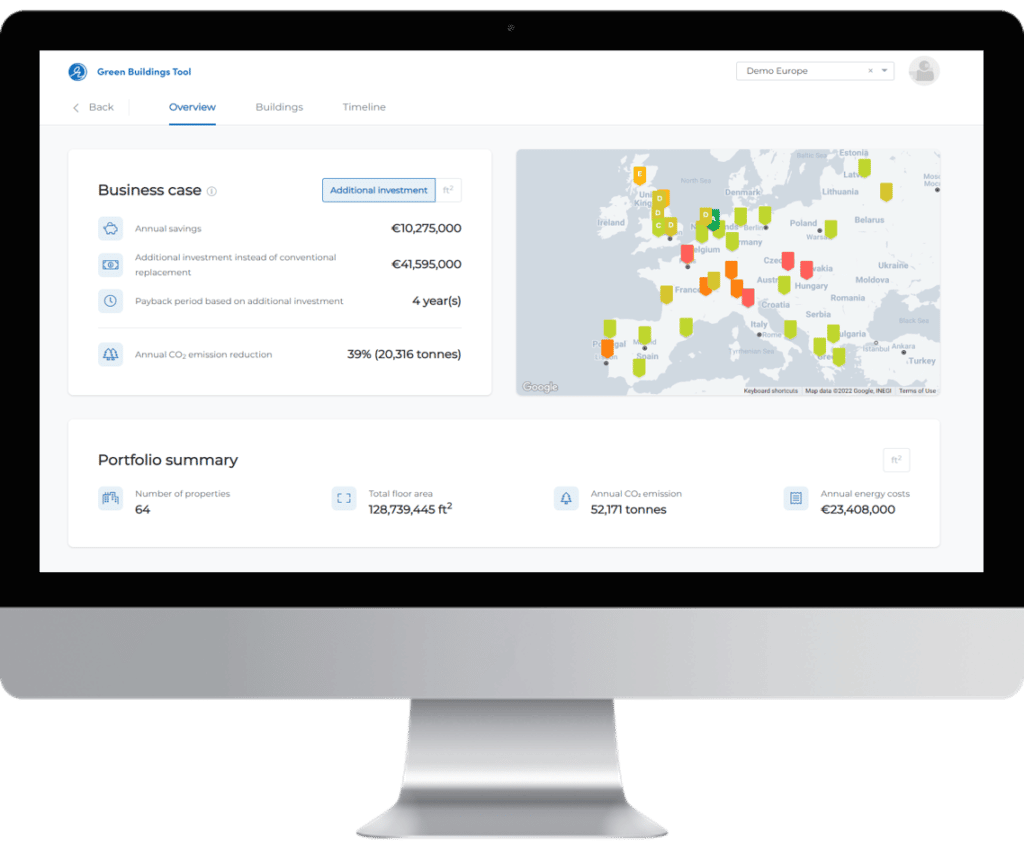

Cut the time spent working on carbon reporting and all key real estate-related ESG abbreviations
How EU banks use the Green Buildings Tool alongside their clients for PCAF, CRREM and the rest.
The real estate sector is increasingly influenced by sustainable developments, where global authorities continuously revise and refine the regulatory framework on ESG to achieve our way to net zero. This has resulted in many frameworks, regulations, directives, and notably acronyms that create a fair amount of unclarity in this sector. Some of these initiatives require immediate attention, while others simply act as guidelines or are not binding yet.
This article explains the most relevant initiatives for the commercial real estate sector and their relation to each other. How the Green Buildings Tool supports financial institutions with related compliance is also set out.

Major EU guidelines and requirements
There has never been an initiative as extensive as the European Green Deal. The aim is to decrease 55% of all carbon emissions by 2030. There are seventeen directives and regulations set to achieve this. The most impactful initiative for the real estate sector is the Energy Performance of Buildings Directive (EPBD). The EPBD is the European Union’s main legislative instrument aiming to promote the improvement of the energy performance of buildings within the EU. This has led to energy efficiency regulations such as implementing MEES regulations in the UK and a minimally required EPC C in offices in the Netherlands in 2023.
Reporting initiatives for financial institutions
The above does not directly translate into actions for financial institutions. Sustainable business activities are required for their compliance. The extent to which business activity is considered sustainable is regulated by the EU taxonomy. This directive is already in place and will increase significantly in scope and specificity in 2024. Additionally, the Corporate Sustainability Reporting Directive (CSRD) is anticipated to go into effect in the same year to replace the Non-Financial Reporting Directive (NFRD). It requires thousands of institutions to report on the impact of their business affairs on sustainability. The EU Commission hopes this legislation will establish uniform EU criteria for carbon and sustainability reporting.
Furthermore, there are varying tools that support energy and carbon reporting. The Partnership for Carbon Accounting Financials (PCAF) is a global, industry-led initiative of financial institutions that work together to develop and implement an approach to assess and disclose the greenhouse gas (GHG) emissions associated with loans and investments (financed emissions). The Carbon Risk Real Estate Monitor (CRREM) looks at buildings’ and portfolios’ energy use and CO2 emissions. It looks into energy consumption and carbon and shows the risk of the property becoming a ‘stranded asset’ and losing its value.
Difficulties in carbon reporting
The previously mentioned frameworks require and guide banks to report on their ESG-related operations. However, when it comes to sustainability in real estate, meeting requirements and reporting can be quite challenging for financial institutions without digital support. Banks and building owners generally do not know how to measure or save carbon emissions. Another challenge to compliance is that there is a bottleneck when it comes to sustainability reporting and retrofitting: there are nowhere near enough energy consultants on earth to visit every building even though all assets require an analysis.
The solution for this is an online tool that provides quick, automated, scalable, and low-cost identification of energy consumption, energy savings and carbon reduction of large real estate portfolios. Furthermore, it should offer actionable insights for financers, owners, and tenants of all buildings.
Our Green Buildings Tool supports sustainability tracking and carbon reporting
At CFP Green Buildings we have developed a platform that provides such simple, large-scale, and specific levels of insight. Entire portfolios, but also individual objects can be processed. Our platform recognises the type of property, retrieves the EPC and sustainability or carbon score, identifies the most relevant sustainability measures, and calculates the business case for the entire portfolio and per building or house.
Sustainability efforts allow businesses to demonstrate their leading role in the sustainability agenda, and the Green Buildings Tool provides a solution for sustainability reporting, as it offers insights into current and potential carbon emissions and energy efficiency. This allows financial institutions to set sustainability targets and comply with PCAF and other reporting standards, as well as use the Tool alongside CRREM assessments.

Feel free to reach out for a free demo to see how we can add value to your business and make a global impact.







